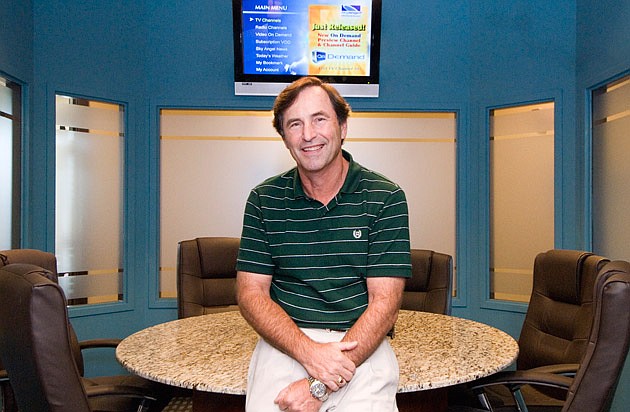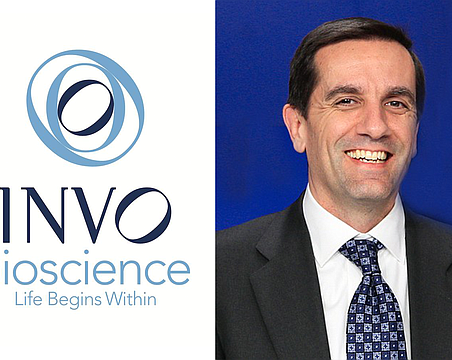What happens when a satellite-television broadcaster loses its transmission? Sky Angel faced that calamity three years ago and gambled on nascent Internet TV despite the risks. How the company survived is a great lesson for any executive facing corporate extinction today.
On Good Friday 2006, Thomas Scott was sitting in church when he got the message he was dreading.
The president and chief operating officer of Sky Angel, a Christian broadcasting network based in Naples, lost nearly half its television channels when the satellite it was using malfunctioned.
Scott knew the EchoStar satellite was going to fail within the next five years, but he didn't expect it to happen so soon after he was hired. He had joined Sky Angel in the spring of 2005 after reaching the pinnacle of the corporate world at package delivery company UPS and cargo giant Atlas Air.
For a television broadcaster, losing satellite transmission is like a newspaper printing press breaking down or a radio-stating tower getting toppled. “We either had to reinvent ourselves or go out of business,” Scott recalls.
To make things worse, the company's visionary founder, Robert Johnson Sr., had died unexpectedly in 2004. The dean of the marketing department at Detroit University, Johnson was one of the pioneers who acquired a satellite transmission license from the Federal Communications Commission in 1981 and was able to launch the network on a limited budget by trading some of those rights in exchange for satellite time.
But when the old satellite started breaking down, a new and more-expensive satellite would be replacing it. Transmission on the new satellite would have forced Sky Angel to triple its modest subscription price and launching its own satellite was prohibitively expensive.
So, in a last-ditch move, Sky Angel turned to a new Internet technology that was promising but not well tested. It was a huge gamble. “If it didn't work, we didn't have a future,” Scott says.
What's more, Scott knew that the company would likely lose half its customers if it converted to Internet television. That's because many of its customers lived in rural areas where high-speed Internet connections are not available.
Sky Angel's survival and eventual return to profitability means more than just providing employment or a return for shareholders.
Ownership of the company passed to Johnson's wife, but when she dies all the shares will be held by the Dominion Foundation. Johnson established the nonprofit foundation to pay for Christian missionary work. “Our vision is to get the gospel to the whole world,” Scott says.
A new model
Scott's background was in global shipping, not broadcasting. Initially, the company caught his attention because he thought it was an airline.
But Scott's unfamiliarity with the industry turned out to be his advantage because he wasn't blind to new ideas that longtime broadcasters would have shrugged off. “I had no preconception of what we could or could not do,” he says, reflecting back.
When the old satellite started breaking down in 2006, Scott knew he had less than two years to save the company. The cost of broadcasting on a new replacement satellite would have tripled the $14.95 price that subscribers pay.
Scott knew his customers wouldn't likely pay the $40 or $50 for the same service.
Scott even explored the idea of Sky Angel launching its own satellite into orbit. Not surprisingly, the $300 million price tag would have been impossible to recoup given that the company only had about 100,000 subscribers.
In spring 2007, Scott hopped on a plane to Las Vegas where he hoped to find an answer to the problem at the National Association of Broadcasters convention. There, he came across a young upstart company from Plainview, N.Y. called NeuLion.
NeuLion was developing technology that could reliably bring television to homes over high-speed Internet connections.
At the time, NeuLion had only two customers: Chinese and Filipino television networks that broadcast to U.S. customers. “Sky Angel was our third customer,” says Chris Wagner, executive vice president and co-founder of
NeuLion. The company now provides Internet TV for ESPN and other big names.
As recently as a few years ago, converting from satellite to Internet television was a gamble. In the fall of 2006, Scott says he was shown a demonstration of similar technology by a Canadian company. “We weren't overly
impressed,” he recalls. “They went out of business after six months.”
But Scott was willing to give NeuLion a chance, mostly because by then he had little choice and the quality of the image was as good as the satellite transmission. “It was survival,” he says.
Converting the flock
Once they had settled on switching to Internet television in early 2007, Scott and Chief Executive Officer Rob Johnson (Johnson Sr.'s son) had two big challenges: retaining customers and spending millions of dollars for new technology to make it work. “Nobody ever got rich here,” Scott chuckles.
They knew that they'd lose half their customers who lived in rural areas, far from high-speed Internet access. “From a cash-flow business, we were going to take a hit,” Scott says. By the time they launched the Internet television channels in February 2008, about 30% of the satellite customers had converted to the Internet service.
Although Scott declines to reveal financial information (Hoover's estimated 2008 revenues at $13.6 million), he says the company invested $15 million to $20 million making the conversion to the Internet, financing it in part using lines of credit for the equipment.
Scott had to hire expert engineers in the advanced technology. He did that by giving them latitude to develop the groundbreaking system. “I'm not a micro manager,” he says. “I let them do their own thing.”
What's more, Scott says he was able to recruit engineers and other employees who were motivated by their Christian faith rather than high salaries and stock options, which Sky Angel couldn't afford anyway. “They believe in this whole mission,” he says.
The set-top boxes that let customers view Sky Angel's channels were a huge cost. Each box, which can link to a wireless router in the home, costs $199. Initially Sky Angel subsidized the full cost for each subscriber. But the cost was so high that it started charging new customers $99 in May. “We hated to do that because it slowed our growth,” says Scott, who declines to cite specific subscriber numbers today.
Poised for growth
Despite the huge costs to convert the broadcaster to the Internet and losing many of its customers in the transition, Scott says the new technology offers more channels and it can now reach more Christians.
With the Internet's broadband capacity, Sky Angel now offers 81 channels of religious and secular programs, plus a growing library of videos on demand. This is much more than the 17 channels they were limited to using the satellite.
The market is huge. By some estimates, there are more than 30 million evangelical Christians in the U.S. (Scott defines evangelical Christians as those who attend church at least twice a week, read the Bible regularly and socialize with other Christians.) And the average American family spends 47 hours a week watching television.
Wagner says the U.S. has 70% broadband Internet penetration, which means it can reach as many as 110 million households. “They could build a very strong business,” says Wagner, who notes that Sky Angel now has little direct competition.
The challenge for Sky Angel executives now is to market themselves with limited resources. “Right now, we realize it will take two to three years to build our customer base,” Scott says. The broadcaster has partnered with like-minded organizations such as the Parents Television Council and the American Family Association to promote the service.
Eventually, Sky Angel has ambitions to broadcast globally. “That box works everywhere,” Scott says, pointing to the television set-top box that is the key to decoding the broadcasts.
But to grow faster and beyond the U.S. borders, the company would need to turn to outside investors. “We could probably tap venture funds,” Scott says. How much money would Sky Angel need? “We need millions, not tens of millions,” he says.
But the company doesn't want to divert from its aim and lose control over the content and the ultimate mission. Scott says there are venture capitalists who have similar Christian goals. “We're talking to a few people like that,” he says.
When the company starts becoming profitable, Scott says he'd like to work with the Dominion Foundation to distribute the money to needy Christians. “I want to walk into a hut in Africa to see how they benefited,” he says. “I'd like to deliver the check.”
Scott, who grew up the son of a mill security guard in Youngstown, Ohio, says his climb up the corporate ladder to the executive suite of UPS and Atlas Air left him wondering if there was more to life. He discovered it at Sky Angel.
“God called me here,” he says.






